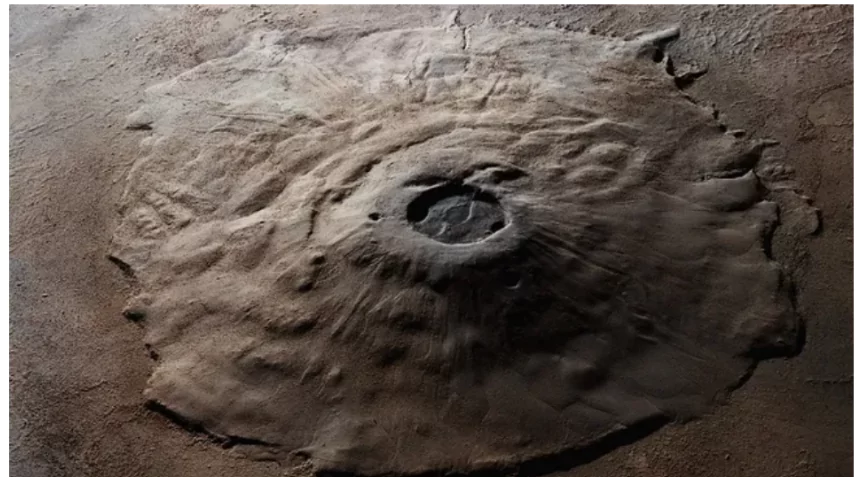Water frost has been detected on the towering Tharsis volcanoes atop the massive Olympus Mons volcano near Mars’s equator for the first time.
Ephemeral Frost Discovered on Mars’ Olympus Mons: 150,000 Tonnes of Water Cycles Daily

- The Frost was first spotted by the European Space Agency’s ExoMars Trace Gas Orbiter (TGO) NOMAD instrument atop the Olympus Mons volcano.
- The Mars Express orbiter also confirmed the unexpected presence of frost across multiple volcanoes in the Tharsis region.
- Findings:
- The frost patches: They are incredibly thin, about the width of a human hair, and cover vast areas within the volcanoes’ summit calderas.
- The amount represents a staggering 150,000 tonnes of water swapping between the surface and atmosphere each day during Mars’ cold seasons, equivalent to 60 Olympic-sized swimming pools.
- Ephemeral Nature: The frost is present for just a few hours around sunrise before evaporating in the daylight. Its existence hints at “exceptional processes” creating a frost-friendly microclimate inside the deep volcanic calderas.
- Significance: It helps to understand how and where this ephemeral frost forms. It could reveal insights into Mars’ atmospheric dynamics and where liquid water may exist, aiding future robotic and human exploration.
Enroll now for UPSC Online Course
About Olympus Mons
- Mars’ Olympus Mons is the largest volcano in the solar system.
- Location: It is found in the Tharsis Montes region near the Martian equator.
- The volcanoes in Tharsis Montes region are so large that they tower above the seasonal Martian dust storms.
- Size: Olympus Mons is the tallest of all the volcanoes found in the region towering 16 miles (25 kilometers) above the surrounding plains and stretching across 374 miles (601 km) approximately the size of the USA state of Arizona.
- Earth Comparison:It rises three times higher than Earth’s highest mountain, Mount Everest, whose peak is 5.5 miles (8.8 km) above sea level.
- Hawaii’s Mauna Loa, is the tallest volcano on Earth, rising 6.3 miles (10 km) above the sea floor (but its peak is only 2.6 miles above sea level).
- Volume: Olympus Mons volume is about a hundred times that of Mauna Loa, and the entire Hawaiian island chain (from Kauai to Hawaii) could fit inside it.
- Formation: A plume of rising magma might have moved beneath the stationary crust as opposed to the Hawaiian islands on earth, which was built from volcanoes that erupted as the Earth’s crust drifted over a hotspot with each eruption creating a small island in a different spot.
- Why are the mountains so tall?
- Unmoving plates: Mars has very limited plate movement and both the hot spot and the crust remains unmoving, which results in a pile up of lava in a single spot. Therefore, large volcanoes such as Olympus Mons form instead of a chain of volcanic islands like on earth.
- Extended lifetime: Martian Volcanoes remained active continuously for million of years resulting in a sort of a steady plume of magma accumulating in one location on the surface of Mars.
- Volcano Type: It is a shield volcano ie. It does not violently spews molten material, and are created by lava slowly flowing down their sides.
- Olympus Mon as a result has a low, squat appearance, with an average slope of only 5 percent.
- Structure:
-
- Calderas: Six collapsed craters, known as calderas, stack on top of one another to create a 53 miles depression at the summit.
- Outer edge: A cliff, or escarpment, surrounds the outer edge of the volcano, reaching as high as 6 miles (10 km) above the surrounding area. (The cliff alone is about as tall as Mauna Loa.)
- Base: A wide depression surrounds the base of the volcano as its immense weight presses into the crust.
![]() 17 Jun 2024
17 Jun 2024
